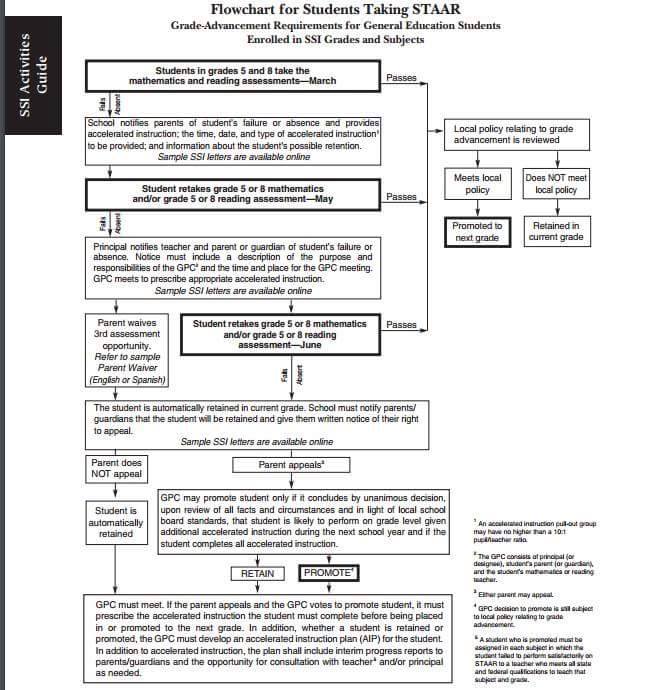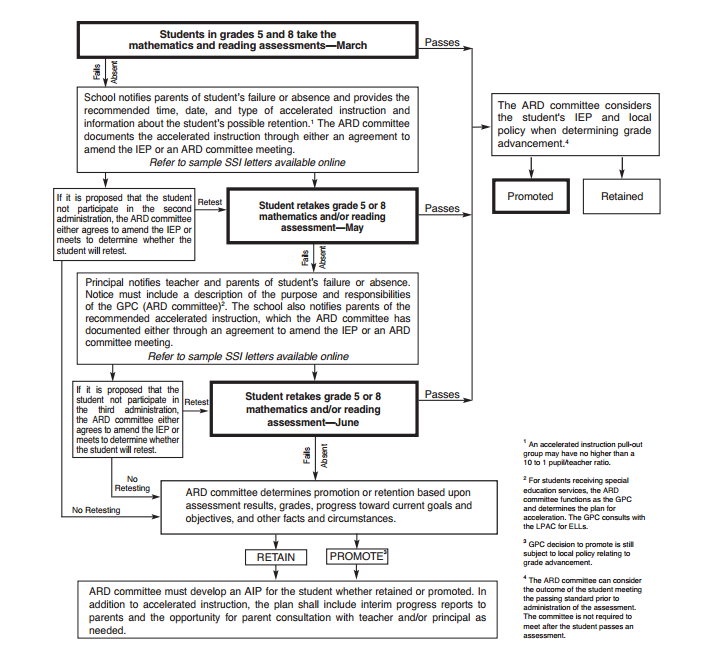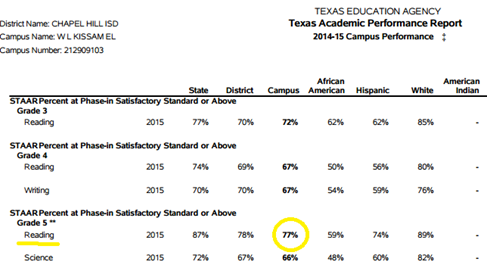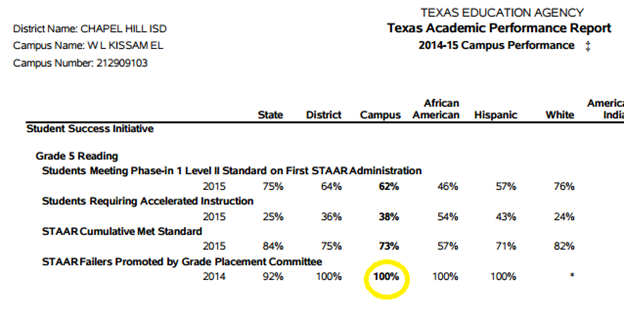by Jennifer Rumsey
March 24, 2016
special to txedrights.net
It’s that time again. Time for STAAR testing in Texas. STAAR is the legislatively mandated series of high-stakes tests for public school children in Texas, and it is the most recent and most difficult of several testing program iterations that began in the 1980’s. I have been a Texas public school teacher since 1999. I have experienced TAAS, TAAS prep, TAAS workbooks, TAAS-aligned textbooks, TAAS packets, and even a TAAS pep rally.
Once students’ statewide overall scores became pretty high, the legislature made the costly move (paid to Pearson) to TAKS. The public schools adjusted: we adopted TAKS-aligned textbooks (published by Pearson), bought TAKS workbooks, held TAKS bootcamps and tutorials. During this time, the lawmakers instilled the Student Success Initiative (SSI), claiming that 5th and 8th grade students would “benefit” by being required to pass the TAKS reading and math tests. If students don’t pass, don’t worry…they “get” two more tries to pass the tests. But if they fail it repeatedly, these children can be retained in grade. Nevermind that research shows that students who are retained are more likely to suffer from low self-esteem and to dropout of high school.
And then there was STAAR, the most ambitious testing program yet. The Texas legislature decided to gut public education funding that year, 2011. The cuts amounted to a loss of$5.4 billion, while they voted to create STAAR and pay Pearson $500,000,000.00. At first adoption, high school students were required to pass 15 End of Course exams to graduate. Now, thanks to grassroots efforts to change excessive testing requirements, high school students only take 5 graduation exams. However, their future life success remains impacted by rules that they must pass these exams to graduate, even with their Carnegie credits earned.
Tuesday my freshmen students must take the 5 hour English I End of Course Exam. I will be one of the lucky test administrators. During one of my test administration trainings, I found out that I am now required to write down the name of each student who leaves the testing room to use the bathroom, the time the student leaves, and the time that they return. This information, along with a seating chart, will be turned in to the Texas Education Agency. I am not sure why. Is it an additional measure of control over the students? Is it an additional measure of control over myself and other education professionals? Is it a deliberate attempt at de-professionalization of educators? When I mentioned to my students that I had to keep track of their times in and out from the restroom, they were puzzled and irritated. One savvy freshman girl asked, “Do they want to know the stall I used also?”
What I do know for sure is that these tests have become far too important. They are treated as top secret, national security-level documents. Why is the material in a standardized test treated as more confidential than the information in the former Secretary of State Hillary Clinton’s emails? I have already signed my oath, and in my test administrator’s manual I am threatened with the loss of my hard-earned professional certification if I share information relating to what is on the test. I am cautioned to in no way purposely view the tests. Ironically, I am allowed to read the writing prompt to a student who requests it… My students are asked to sign an honor statement as well about not sharing the test material. During the five-hour testing block, I must “actively monitor” the students in my room, making sure they don’t cheat, don’t forget to bubble their answer document, don’t sleep. In the past, I have been warned that I am in not allowed to sit down during this all-important monitoring session. I may not read or write anything. I may only monitor, monitor, monitor, resting only on a “perch” of a stool for a short while before getting back up and walking the silent room filled with stressed students whose self-worth depends on their bubbled answers.
Tuesday is a big day for my little family. If my daughter doesn’t pass the math STAAR test, she will face the possible future of retention in fifth grade. My 10-year-old daughter is one of the unlucky guinea pig fifth graders in the state of Texas. My sweetie is a captive of the Student Success Initiative and one of the unlucky children impacted by a State Board of Education decision from 2015 that “pushed down” developmentally inappropriate math TEKS objectives. Some of the newly required 5th grade material was, until 2015, not taught until the children were in the 7th grade. What does this “pushing down” of objectives do? It requires more material to be taught during the school year, stealing valuable time that math teachers need to teach the foundational material for that year. It makes math harder and more rushed for the children. It is wrong. The TEA suspended the math passing requirements for 5th graders last year. But not so this year. Nope. My child and her peers must pass this test or face retention in grade. And wait, the news just gets better. The outgoing Commissioner of Education announced near his departure that, “STAAR performance standards have been scheduled to move to the more rigorous phase-in 2 passing standard this school year. Each time the performance standard is increased, a student must achieve a higher score in order to pass a STAAR exam” (http://tea.texas.gov/About_TEA/News_and_Multimedia/Press_Releases/2015/Commissioner_Williams_announces_STAAR_performance_standards_for_2015-2016_and_beyond/).
Thus, my daughter and all her little 10 and 11 year old friends are being held accountable for inappropriate math standards and will be judged at a higher performance standard at the same time. Something is not right here. Something is very, very wrong. My child is not a subject to be experimented on.
While my child is held to harder performance standards, the TEA has failed to comply with laws passed this legislative session. The 2015 legislature passed HB 743, and Governor Abbott signed it into law. This law requires that the TEA redesign STAAR assessments in grades 3-5 so that 85% of children testing can complete them in two hours. Currently, the assessments are four hours in length, far too long. The TEA has not shortened the tests for this year, ignoring the law. Why is my 10 year old held to higher performance standards on developmentally inappropriate math objectives, threatened with grade retention if she fails, but the TEA is getting away with ignoring the law? In my view, this refusal to follow the law invalidates all test scores for all children in grades 3-5 this year.
Research shows that standardized tests are not a true measure of what a child knows. I can tell you that they are not any kind of measure of a child’s worth. The children in the state of Texas deserve better than to be over-tested and experimented on. I am an expert in the field of education. I am a professional. I am a teacher. I know when my students are learning. I love seeing the light in their eyes when they have mastered a difficult concept, the excitement on their faces when they ask if they can continue reading a novel that they truly enjoy, the beauty in their smiles when I praise their successes. As far as being accountable, all teachers are accountable. We always have been. We are accountable to the children in our care, the children who become ours for a year, the ones we listen to when they are sad, the ones we feed when they are hungry, the ones we teach. It is time for the lawmakers and the TEA to be held accountable. Texas children are not subjects for your high-stakes experiments. They deserve better.











